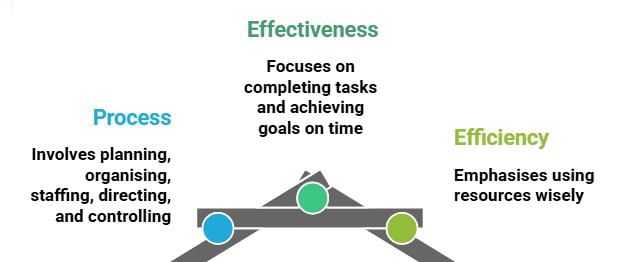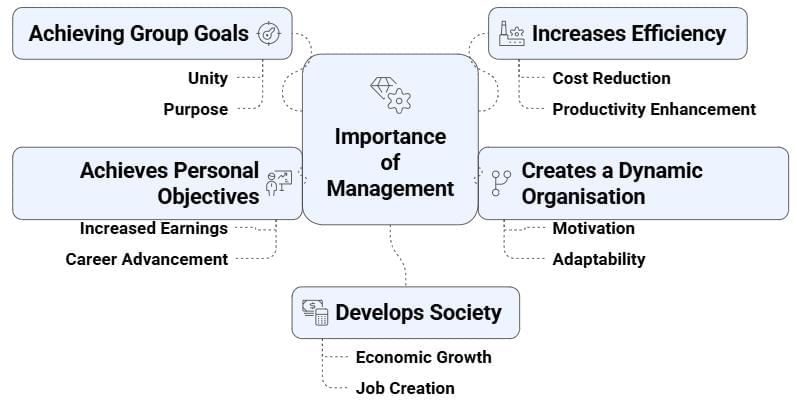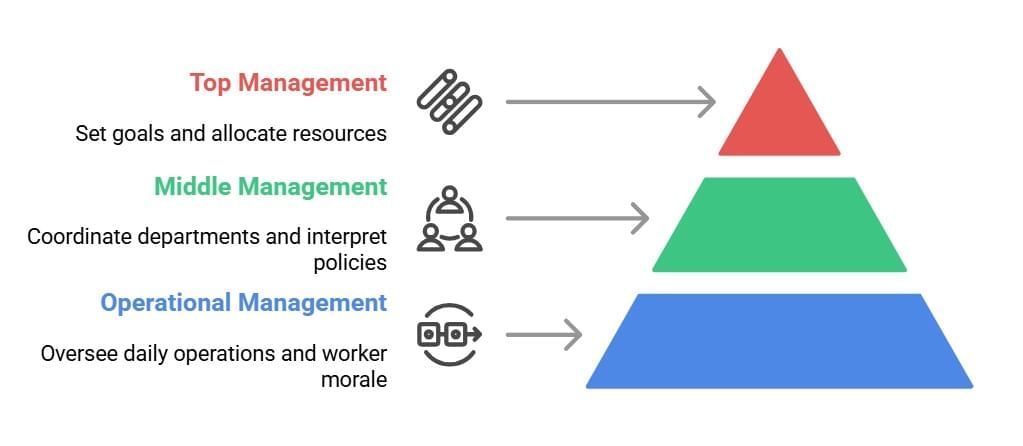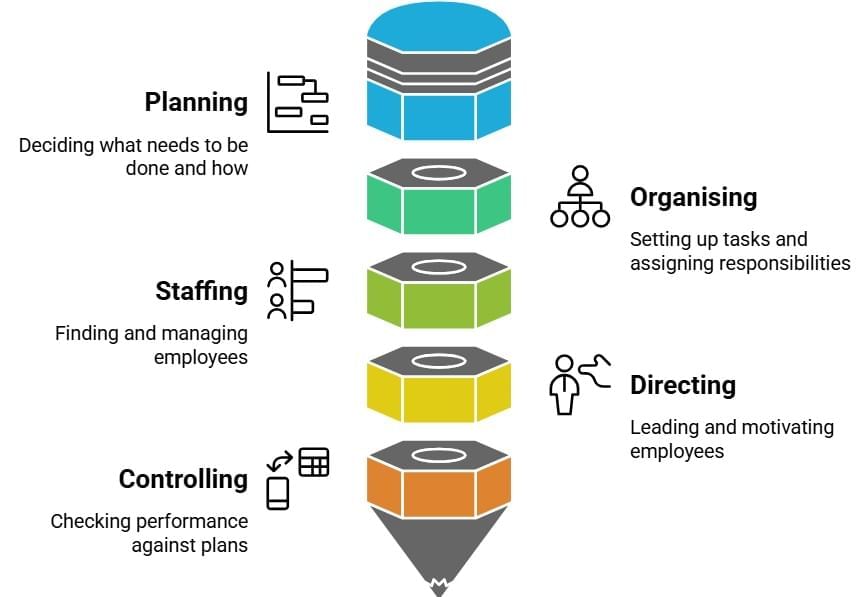Poonam Gandhi Summary: Nature and Significance of Mangement - Commerce PDF Download
Concept of Management
Management means achieving organisational goals by getting the right results and using minimal resources. It involves getting the right results (effectively) and using resources wisely (efficiently).
Key Aspects:
- Process: Involves planning, organising, staffing, directing, and controlling.
- Effectiveness: Focuses on completing tasks and achieving goals on time.
- Efficiency: Emphasises completing tasks with minimal cost and optimal resource use.

Effectiveness vs. Efficiency:
- Effectiveness is about doing the right task, while efficiency is about doing the task correctly with minimal waste.
- Both are essential for organisational success as they complement each other.
Characteristics or Features of Management
Goal-Oriented: Management is focused on achieving the organisation's objectives by directing individual efforts towards common goals.
Pervasive: Management applies to all types of organisations, whether large or small, profit-making or non-profit, and is relevant worldwide, although the techniques may vary.
Multidimensional: Management involves:
- Management of Work: Completing tasks specific to the organisation, such as teaching in schools or manufacturing in industries.
- Management of People: Utilising human resources by enhancing strengths and minimising weaknesses.
- Management of Operations: Overseeing production processes from inputs to finished products by integrating work and personnel.
Continuous Process: Management functions like planning and organising are performed continuously.
Group Activity: Management involves teamwork, where individual efforts are coordinated to achieve the organisation's success.
Dynamic: Management is flexible and adapts to changes in social, economic, technical, and political contexts.
Intangible: Management is not visible but is reflected in the orderliness and coordination observed in the workplace.
Objectives of Management
Objectives are the specific goals that an organisation aims to achieve. They serve as a guiding framework for the organisation's activities and efforts.
Categories of Objectives
1. Organisational Objectives
- Survival: Ensuring the organisation can cover its costs and continue to operate.
- Profit: The main goal of any organisation is to earn a sufficient amount of profit. Profit is crucial for survival, growth, and expansion, serving as a reward for taking risks.
- Growth: Organisations must grow and expand their activities. The success of an organisation is measured by its growth rate, which can be seen in sales, the number of branches, products, employees, and so on.
2. Social Objectives
- Providing quality products at fair prices
- Creating jobs for the community
- Adopting eco-friendly methods in operations
- Supporting community initiatives and projects
3. Personal/Individual Objectives
- Offering competitive salaries and benefits
- Providing training and development opportunities
- Encouraging personal development and peer recognition
- Promoting a healthy work environment to enhance motivation and job satisfaction
Importance of Management
1. Achieving Group Goals: Management ensures that individual goals are aligned with the overall objectives of the organisation. This alignment is crucial for directing everyone’s efforts toward common aims, fostering a sense of unity and purpose within the team.
2. Increases Efficiency: Effective management focuses on optimising resource use, which helps in reducing costs and enhancing productivity. By utilising resources—be it time, money, or manpower—more efficiently, organisations can achieve better results with less waste.
3. Creates a Dynamic Organisation: Management plays a key role in motivating employees to develop their skills and adapt to changes. In today’s fast-paced environment, the ability to learn and adjust is vital for maintaining a competitive edge, and effective management fosters this adaptability.
4. Achieves Personal Objectives: Good management not only benefits the organisation but also supports employees in reaching their personal goals. By increasing productivity and efficiency, employees can potentially earn more and advance in their careers, which is a significant motivator.
5. Develops Society: Management has a broader impact on society by contributing to economic development. Through the production of quality goods, job creation, and offering competitive wages, effective management stimulates economic growth and societal progress.

Nature of Management
Management as a Science
Management is considered a science because it involves a systematic and organised body of knowledge. This includes principles that can be verified and an understanding of the relationships between causes and effects in various managerial situations.
Characteristics in Management:
- Systematic Body of Knowledge: Management is based on a systematic body of knowledge, which includes various management theories and studies.
- Situational Principles: Unlike some sciences that have universal principles, management principles are not universal. They vary because managerial decisions are influenced by specific situations and contexts.
Management is considered an applied science or an interdisciplinary field. This is because it incorporates elements of social sciences and employs quantitative methods similar to those used in natural sciences. This interdisciplinary approach provides a more comprehensive understanding of the scientific nature of management.
Management as an Art
Involves using knowledge with personal skill, creativity, and practice.
Characteristics in Management:
- Systematic Knowledge: Managers apply a collection of knowledge (like management theories) creatively in various situations.
- Personalised Application: The effectiveness of management is shaped by how creatively managers apply principles in different contexts.
- Practice and Creativity: Managerial abilities are enhanced through experience and creative application.
Management is an art, demanding personal skill and creativity to produce results. For instance, successful managers often use their unique creative methods to address challenges and foster innovation within their teams.
Management: A Blend of Science and Art
Nature of Management: Management is both a science and an art. As a science, it involves structured knowledge, while as an art, it requires creative application and practice.
Integration in Practice: In all management roles, theoretical knowledge is applied creatively to achieve objectives, demonstrating the integration of science and art.
Management as a Profession
Understanding a Profession:. A profession is characterised by specialised knowledge, restricted entry, professional groups, and a code of ethics.
Management's Characteristics:
- Body of Knowledge: Management has a well-defined knowledge base, including books and research.
- Entry Restrictions: While there are no strict entry requirements, organisations often prefer candidates with MBAs, indicating a trend towards professional standards.
- Professional Associations: Although management lacks official bodies like those for doctors or lawyers, some organisations offer certifications and set standards, showing a move towards professional recognition.
Progress Towards Professional Status: Management is not yet fully recognised as a profession, but it is moving in that direction with a greater emphasis on formal education and ethical standards.
Levels of Management
Management is divided into three levels based on authority and responsibility.
1. Top Level Management:
- Comprises the Board of Directors, the Chairman, and other high-ranking officials.
- Functions: Set goals, formulate plans and policies, organise activities, allocate resources, ensure the organisation’s survival and growth, communicate with external stakeholders, and analyse the business environment.
- Focus: Primarily on planning and organising; these roles are complex and often stressful.
2. Middle Level Management:
- Includes heads of departments such as sales, finance, and production managers.
- Functions: Interpret policies from top management, organise departmental activities, recruit and select employees, motivate staff, and coordinate with other departments.
- Focus: On staffing and coordination; they act as a link between top management and lower levels.
3. Lower/Supervisory/Operational Level Management:
- Comprises supervisors, foremen, clerks, and other lower-level managers.
- Functions: Address worker grievances, maintain working conditions, ensure safety, uphold quality standards, boost morale, and oversee daily operations.
- Focus: On directing and controlling; they ensure the quality and quantity of output.

Functions of Management
1. Planning: This is about deciding what needs to be done, how to do it, when, and who will do it. Planning helps to move from the current situation to the desired one and is the main function of management.
2. Organising: This involves setting up tasks, forming teams, assigning responsibilities, and defining authority relationships to implement plans.
3. Staffing: This includes finding, selecting, training, and assigning roles to employees, as well as managing their relationships and performance.
4. Directing: This is about leading employees by giving instructions, motivating them, supervising their work, communicating effectively, and providing leadership to achieve objectives.
5. Controlling: This means checking actual performance against planned performance, identifying any gaps, and making necessary adjustments to stay on track with the plans.

Coordination: The Essence of Management
Coordination refers to the process of aligning and integrating activities across various departments to ensure a cohesive and unified approach towards achieving organisational goals. It is the essence of management, as it brings together different efforts towards a common purpose.
Role in Management: Coordination is crucial in every management function, including planning, organising, leading, and controlling. It is necessary at all levels of management:
- Top Management: Coordination at this level ensures that activities across the entire organisation are aligned and working towards common objectives.
- Middle Management: Middle managers balance the efforts of different departments, ensuring that their activities complement each other and contribute to the overall goals.
- Lower Management: At this level, coordination involves managing and directing the activities of individual workers to ensure their efforts are aligned with departmental and organisational objectives.
Coordination is vital for the success of an organisation. Poor coordination can lead to misunderstandings, conflicts, and ultimately, failure to achieve goals.
Nature/Features: Coordination has several key features:
- Integration of Efforts: It brings together the efforts of different individuals and groups towards shared objectives.
- Continuous Process: Coordination is an ongoing activity that is carried out by all managers, not just at specific times.
- Deliberate Function: It is a planned and intentional activity aimed at ensuring that efforts are arranged in an orderly manner towards achieving goals.
Coordination plays a vital role in effective management by ensuring that all activities are aligned towards achieving the set goals.
It fosters cooperation among different departments, reducing conflicts and helping to align individual objectives with organisational aims.
Importance of Coordination in Management
- Growth in Size: As organisations grow larger, coordination becomes crucial to align the diverse efforts and goals of individuals with common objectives.
- Functional Differentiation: Different departments within an organisation often work independently towards their specific goals. Coordination is necessary to integrate their activities into a cohesive whole.
- Specialisation: While specialisation brings expertise, it can also lead to isolated decision-making. Effective coordination is essential to align the efforts of specialists, preventing disorder and maximising the benefits of their expertise.
FAQs on Poonam Gandhi Summary: Nature and Significance of Mangement - Commerce
| 1. What is the nature of management according to Poonam Gandhi? |  |
| 2. Why is management considered significant in organizations? |  |
| 3. What are the key functions of management outlined in the article? |  |
| 4. How does Poonam Gandhi define the relationship between management and leadership? |  |
| 5. What skills are essential for effective management according to the article? |  |














